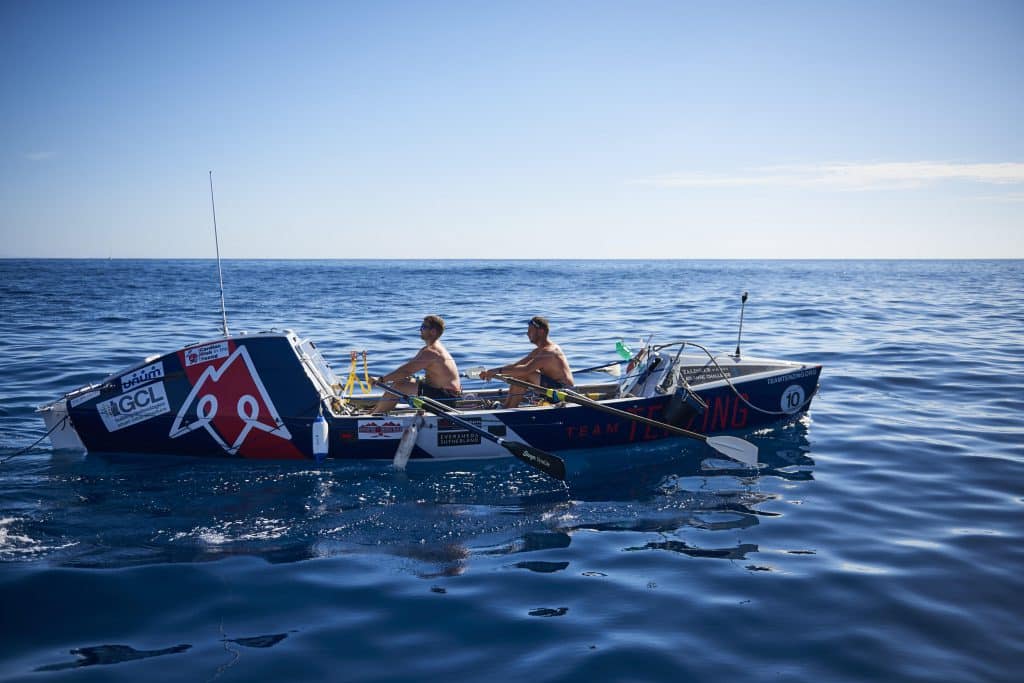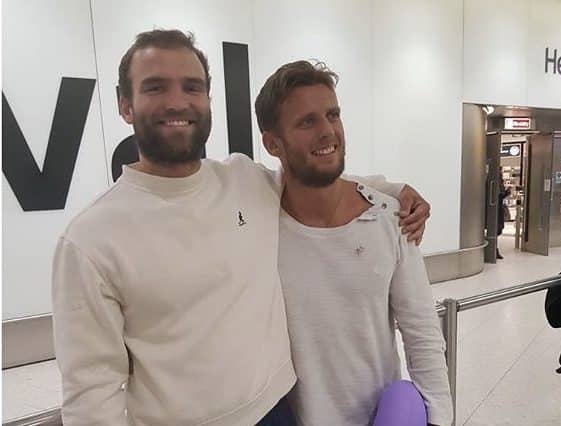ONE of the survivors of a desperate transatlantic rescue has spoken of the day he and his rowing partner battled for their lives after their boat capsized in the middle of the ocean.
One of the survivors of a desperate transatlantic rescue spoke yesterday [Tuesday] of the day he and his rowing partner battled for their lives after their boat capsized.
School friends Chris Williams and Max Thorpe, both 25, had to be picked up by an oil tanker in the middle of the ocean after their boat caught fire during the 3,000-mile Talisker Whisky Atlantic Challenge race three days before Christmas.
Their Team Tenzing craft had been at sea for nine days and they had rowed 700 miles non-stop when it was caught in a severe storm and capsized under the impact of immense waves.
The pair, who both attended The Judd School in Tonbridge, were left to fend for themselves for more than 16 hours in a Force Nine gale while awaiting a rescue ship.
And when the tanker arrived, they had to cling on to ropes dangled down the side of the massive vessel in what Chris called ‘the most dangerous part of the whole episode’.
After spending 18 days aboard the ship they reached Brazil and then flew home to their relieved families and friends.
“It’s one of those funny things,” said Chris, “it feels like a distant memory when I’m walking out my front door on to the St John’s Road in Tunbridge Wells.”
The boys were taking part in the gruelling challenge to raise money for Cardiac Risk in the Young, a charity that provides free screenings to identify heart defects.
They were aiming to break the record for rowing pairs despite having no experience of the rigours of such an endurance event.
“We had one extreme row on the Channel, a couple of days and a night, but you can count on the fingers of one hand the number of times we were at sea training,” admitted Chris, who captains Tunbridge Wells Cricket Club’s 1st XI.
“We were on pace to crush the record. We were doing 80 miles a day and after nine days we were leading the pairs’ race.
“We were getting a lot more accomplished and going from strength to strength. We were in a good place and in good spirits.”
The weather deteriorated after they left La Gomera in the Canary Islands, heading for Antigua, but they remained confident.

“For four or five days the conditions had been really rough, with unusually high winds. We were comfortable with it, though, it was becoming normal.
“We felt at home out at sea with nothing but water around us. We were very isolated, there had been just one passing ship on the horizon.
“The dolphins paid us a visit on a couple of occasions. You realise how small you are when you are out there on your own.”
But the oceans remain an unconquerable realm and although the boys were trained to deal with a capsize, they could not have been prepared for the storm that was about to strike.
“We couldn’t believe the size of the waves, it was like our worst nightmares,” recalled Chris. “They were 10 to 15 metres high when coupled with the swell – huge walls of water coming at us all day long.
“You can’t really practise a capsize situation, but it unfolded as we hoped. We were harnessed on to the safety line, and the boat went back the right way up, as it’s supposed to do.
“We went back to the cabin to use the satellite phone to call and say we were okay and could carry on because the emergency beacon had gone off.
“We opened the door and were faced with thick smoke. The batteries were exposed, but we managed to put out the fire and stop the immediate danger.”
Despite their inexperience, the pair showed remarkable calm. “We assessed the situation and we had no power. There must have been one battery still working because the automatic rudder was still going. But we couldn’t get in the cabin because of all the toxic smoke.
‘Max fell off into the sea. He was being hit by the waves, for about 10 seconds he was swimming for dear life’
“In the heat of the moment we followed what we thought was the right way to deal with it. If we had started to panic it might have had a negative impact. We dealt with the situation well mentally.”
They set off the emergency beacon again, which sent a message to the UK coastguard. They contacted their Spanish counterparts, who triangulated the boat’s position and sent out an alert for any craft in the vicinity.
“This was at about midday. We were just trying to avoid capsizing again. We would stand in the centre of the eight-metre boat and throw our bodyweight into the stern to stay upright when the waves hit. We did that for about seven hours.
“Then we received info that we wouldn’t be rescued until midnight. We climbed into the storage hatch – not the cabin, this was smaller, about 1.4m long.
“It was a tiny area for two big guys and we were being thrown around and upside down. But I managed to pass out for a while with some medication.
“We were having contact from the race officials at two-hourly intervals and they eventually told us we would be rescued at 3am.
“At 4am we could see a light on the horizon. But the sea was still horrendous and it was raining heavily. These were Force 9 conditions – Force 10 is a hurricane.”
The full extent of the danger they faced was now brought into stark focus. “We were faced with this wall of an oil tanker, it was 250m long and smashing into our boat,” says Chris.
“They shone down spotlights, and they thought we were on a life raft so all they did was throw down ropes for us to attach to it. But we couldn’t hook the ropes onto anything.
“Max managed to cling on to the rope but I was really struggling, it was incredibly hard to hold on. I was biting the rope to keep hold and ripped a couple of teeth out of my mouth.
“Then Max fell off into the sea. He was being hit by the waves but for about 10 seconds he was swimming for dear life.
“They finally sent down a rope ladder and he was able to pull himself back up. It was the most dangerous part of the whole episode.”
Once they had been hauled aboard, the boys had to wait until the tanker reached Rio before flying back to Britain.
“It was one of those incredible experiences,” reflected Chris. “It’s something for us to tell our kids. We will always cherish the memory. We are better for having had it.
“It’s been great to come back and relive it because we didn’t do that on the tanker. We just wanted to be back home. We were trying to move forward with as much positivity as possible.”
Several records were broken in the race because the conditions were so bad that the boats were moving much faster than usual.
But for the time being Chris and Max have no plans to have another crack at it. “For the sake of having a girlfriend who loves me, I had better take a step back,” said Chris. “I’m just looking forward to playing some cricket. But never say never.”
The rescue itself was first reported in the Times earlier this month.








